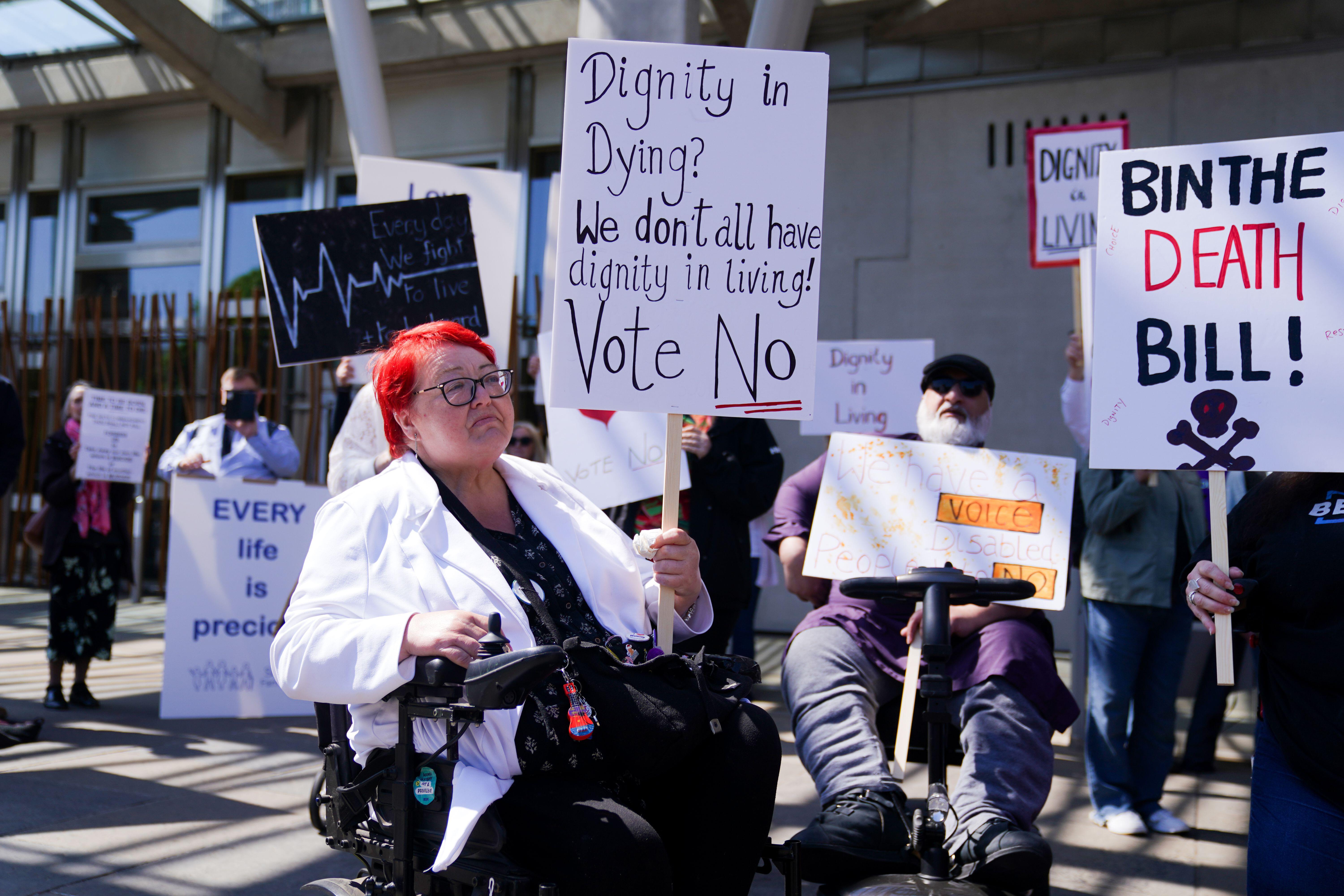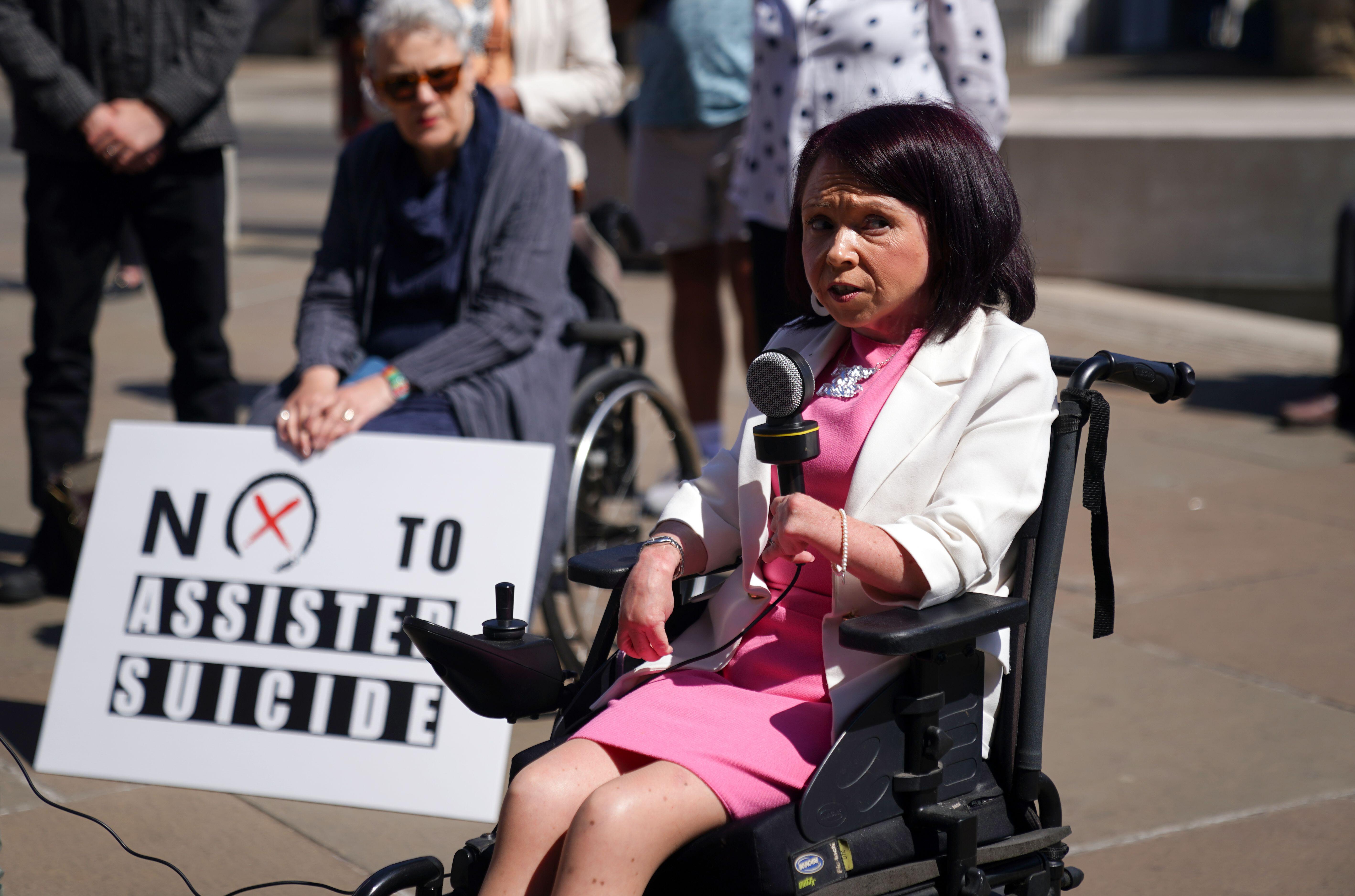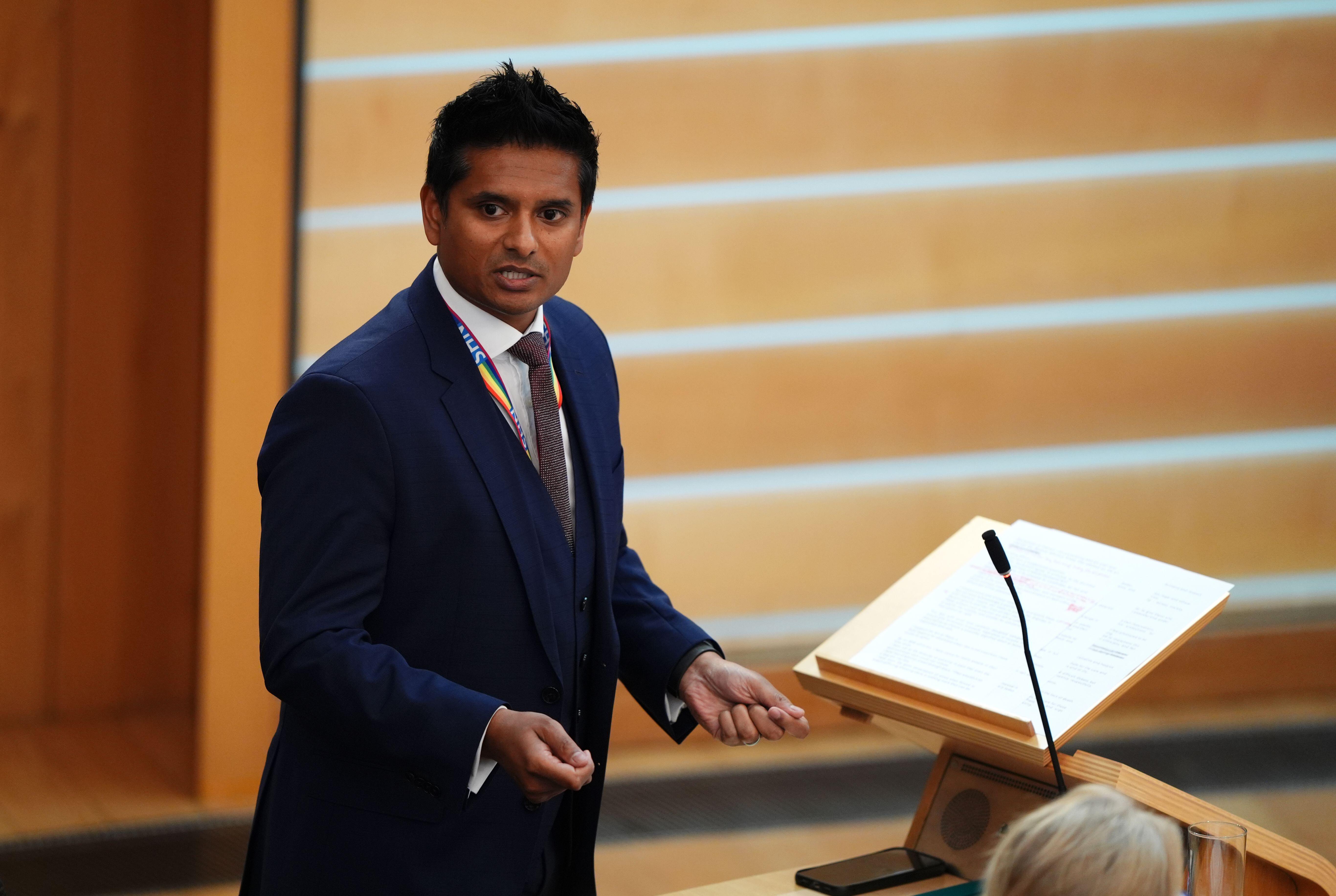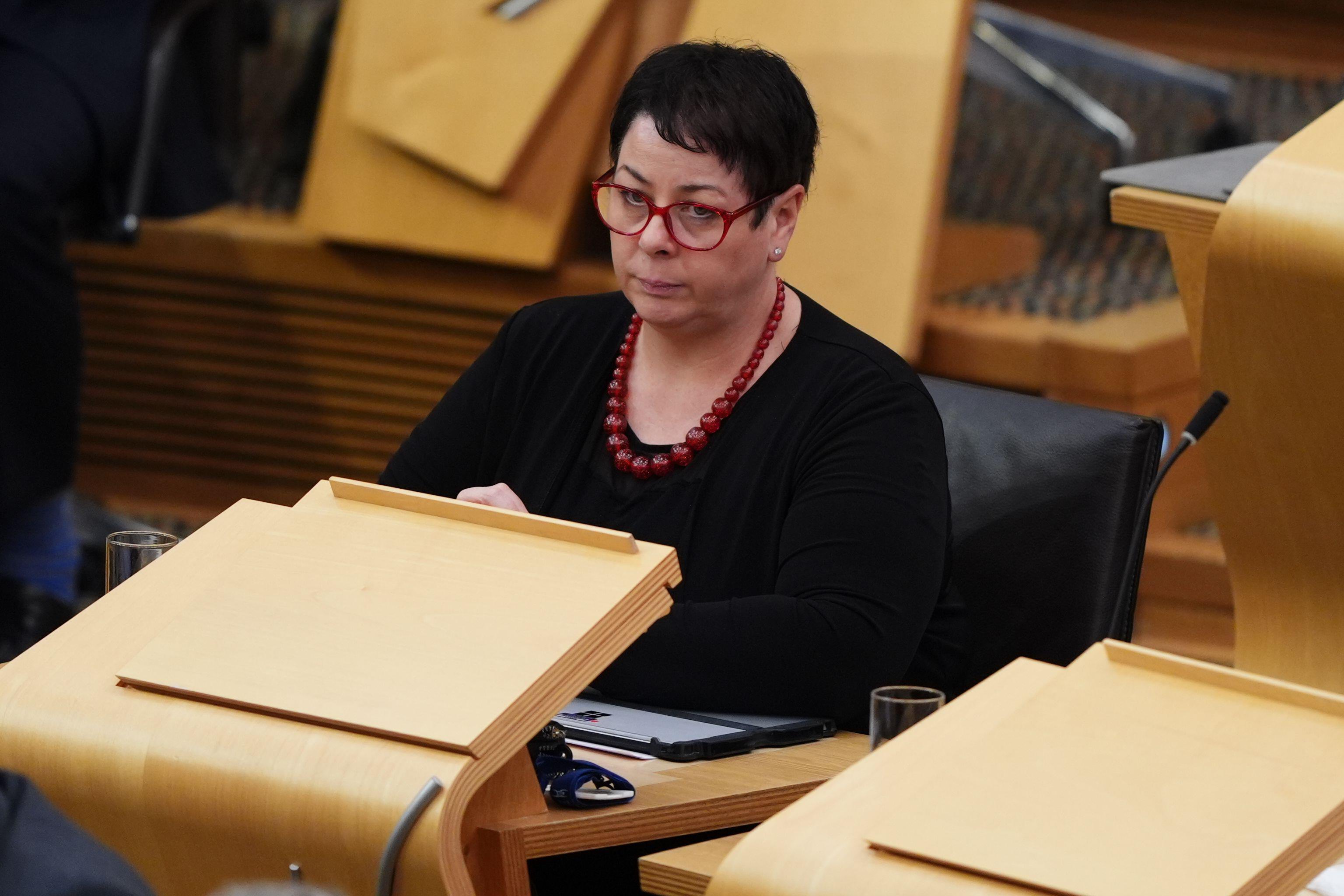Assisted dying: How Scotland moved a step closer to a change in the law
Outside the Scottish Parliament, the building flanked by members of the Scottish Family Party on one side and members of the Glasgow Disability Alliance (GDA) on the other, a Canadian tourist approaches to ask about the assisted dying bill.
Both groups are here, separately, to protest the bill in the hours before its first vote. They are very different organisations, the first archly social conservative and serially unsuccessful at the ballot box; the second amongst the largest disability rights organisations in Europe.
Both are coming at the issue from different angles, but that they are here at the same time is an indication of how the public debate on assisted dying has created strange bedfellows.
Assisted dying has been legal in Canada since 2016, when it was first available only to the terminally ill. It has since been widened to cover those with chronic conditions and will soon be extended to those whose sole underlying condition is a mental illness.
The tourist, a mature man with moustache and cap, is visiting from Halifax in Nova Scotia and says his brother-in-law chose what in Canada is termed a medically-assisted death. “It’s just accepted now by most folks,” he says. “These folks in wheelchairs shouldn’t have anything to worry about,” he adds, nodding towards the GDA group.
“The argument against it is that folks with different abilities might be forced into it, but these folks have a life to live and they should enjoy it without fear, and I think that is the case in Canada.”

The Scottish Family Party and Glasgow Disability Alliance both oppose the legislation | Alamy
Indeed, opponents of the bill fear the potential for coercion, explicit or not, by families, carers and even the state.
The Canadian experience, that widening of criteria, has contributed to their concerns. Official figures show 13,100 people underwent medically-assisted deaths in 2022 in what was a 30 per cent year-on-year increase. Twelve months on, the annual tally rose again to 15,300. Research by Health Canada found isolation or loneliness was a factor for more than 17 per cent of the 2022 cohort. The perception of being a burden to family, friends or carers was raised by 35 per cent.
At Holyrood, the neutral stance taken by the Scottish Government and the free vote handed to party members has offered a chance for those on rival benches to find common cause. “It has brought people together,” says Jeremy Balfour, looking on. In his opposition to the bill, the Conservative MSP has found himself in disagreement with his party’s leader Russell Findlay, aligning instead with figures like Pam Duncan-Glancy of Labour and the SNP’s Emma Roddick. “We are probably three quite different politicians in regards to the day’s bread-and-butter, but on this issue we are absolutely united and have been able to put aside our political differences,” he tells Holyrood.
On the morning of the vote, Fraser Sutherland of the Humanist Society Scotland says it’s about “compassion, dignity, and the fundamental right to choose” and, standing outside the Scottish Parliament, warns that opponents of the bill will “try and drown out reason with fear”.
Later in the day, speaking from almost the same place on the pavement, GDA member Susan Douglas-Scott – the interim chair of the National Care Service Advisory Board and director of the board of the NHS Golden Jubilee – calls the proposals “terrifying for disabled people”.
“People in there will tell you that this is safe legislation,” she says of the parliament. “That is not the case.”

Susan Douglas-Scott looks on as Pam Duncan-Glancy MSP speaks | Alamy
When the debate finally arrives, campaigners from both sides of the argument watch from the public gallery. The bill passes its first reading by a margin of 14 votes, but MSPs, including some of those who will vote in favour, raise questions about definitions, safeguards, opt-outs for medical staff, from what budget training costs would come from, and even what drugs would be prescribed to those approved for an assisted death.
Answers to these questions, it is hoped, will emerge during stage two considerations.
And, during almost five hours of debate, there is also the question of how such a law might be implemented, given the limitations of the Scottish Parliament’s devolved powers, particularly if lawmakers in England and Wales choose not to back similar measures proposed there.
A bill brought by Labour’s Kim Leadbeater has now reached its report stage, with the final vote expected in the first half of June. The Isle of Man passed its own Assisted Dying Bill in March which is currently awaiting royal assent, and provisions there could be in force by 2027. New rules in Jersey could take effect around the same time, if final legislation there is approved. In contrast, there are no plans to adopt such measures in Northern Ireland. And the picture means that, whatever is decided in Scotland, the position around the British Isles will not be uniform.
Concerns that people will simply cross borders to take advantage of assisted dying in different parts of the British Isles have been countered by minimum residency provisos in local legislation.
But to make Scottish legalisation work will take cooperation and agreement with the UK Government – something that has proven difficult to achieve in recent years.

Alex Cole-Hamilton congratulates an emotional McArthur | Alamy
Liam McArthur, the Lib Dem MSP who proposed the Assisted Dying for Terminally Ill Adults (Scotland) Bill, says his model, aimed at offering a choice to mentally competent patients who have lived in Scotland for at least 12 months, is broadly in line with those in Australia and New Zealand.
And he acknowledges the many qualms the parliament collectively has about making this profound change. He has already said he will raise the minimum age threshold from 16 to 18 and suggests other changes are possible.
And, in the debate, McArthur offers wavering MSPs a get-out – vote for the bill at stage one then reject it at stage three if still unconvinced. “If you accept that the current ban on assisted dying results in too many bad deaths, which traumatise patients as well as the families and friends left behind; if you recognise that legal uncertainty is placing patients, families and medics in an invidious position; and if you believe in the principle of allowing dying Scots more choice of and control over the way in which they die,” he tells MSPs, “you must, even if you feel that my bill needs to be amended and have its safeguards strengthened, vote to allow parliament the opportunity to consider amendments.
“If you remain unpersuaded at stage three, you are free to vote the bill down, but it is surely not tenable for parliament to say once again that this is all too difficult and to refuse to undertake the work required to find out whether a bill that commands majority support and public confidence can be agreed to.”
That ‘once again’ is significant. It is of course the third time the Scottish Parliament has considered this matter. On the first occasion, in 2010, proposals were defeated at stage one by 80 votes to 16 with two abstentions. On the second, they fell by 82 votes to 36, with nine members not voting.
Of the current cohort of MSPs, more than 40 have taken part in one or both of the previous votes, and so are perhaps more familiar with many of the arguments advanced on both sides, such as that there should be greater funding for palliative care, that the right to choice is paramount, or that recourse to assisted death overseas is already available to those with the means. Few of this cohort have changed their thinking over the years, with just a handful now voting in a different direction.

GP Sandesh Gulhane MSP recalled the deaths of patients | Alamy
Before last week’s vote, several MSPs voting for the bill, including government ministers, confided that they might change their stance at stage three. Some members said as much in the chamber, arguing in favour of examination and debate on the issues, if not for a particular outcome. “I will vote for the bill at stage one, not because I support it as it is currently drafted but because it is the parliament’s job to wrestle with the most difficult issues that face our society, and I believe that there are none more difficult than this,” says Green MSP Ross Greer.
Indeed, MSPs are wrestling with it. “We risk creating an environment in which people feel pressure, however subtle, to choose death to spare others the burden of their care,” former hospice nurse Marie McNair says, adding that “we fundamentally cannot guarantee with any certainty that the eligibility criteria will not be expanded in future years”. “I have heard families plead through tears that they ‘wouldn’t let a dog die like this’,” says GP Sandesh Gulhane. “We must offer compassion, choice and dignity at the end of life.”
As the result is announced, McArthur holds his head in his hands. He hails the stage one success as a “landmark moment for Scotland”. “This bill has been a long time coming but, at long last, it can offer that compassionate choice for the small number of terminally ill Scots who need it,” he says.
Conversely, Duncan-Glancy, the parliament’s first permanent wheelchair user and a leading objector to the bill, says she is “heartbroken”. “There are no safeguards that could address the concerns identified in this bill,” she says. “I believe this will become clear and hope MSPs will see that and ultimately vote the bill down at stage three.”
As much as McArthur has been praised for the diplomatic, considered way in which he has promoted his bill, so Duncan-Glancy has influenced the counter argument. “A person would have to have a heart of stone not to have been touched by the compelling arguments that she gave in her short speech,” says Conservative Stephen Kerr of Duncan-Glancy’s contribution to the debate.
Twice as many of her party colleagues voted against the bill as for it. And while most Labour MPs voted in favour of the separate proposals going through Westminster, the majority of the party’s Scottish bloc did not. “I have made a lot of representations to my colleagues,” Duncan-Glancy tells Holyrood. “I wouldn’t like to overplay my influence in it but there’s always something to be said for lived experience and I know my colleagues respect it.”

Elena Whitham MSP said her mother deserved to 'plan a compassionate death' | Alamy
Accounts of lived experience play a significant part in what is an emotional Holyrood debate. While some recount testimonies from constituents, Elena Whitham recalls her mother’s decision to “starve herself in order to hasten her inevitable death” after a diagnosis of terminal stage four lung cancer. “She woke up very briefly on the morning she passed away, when she was not sedated quickly enough,” the former Scottish Government minister says.
“None of us will ever forget the terror on her face when she realised that she was not dead after being unconscious for three days. My mum deserved to be able to plan a compassionate death, surrounded by her family, not one that she had to conduct in secret.”
George Adam, another former minister, speaks of his wife Stacey, who has MS, saying, “the thought of life without her is unbearable”, arguing that she should have “the choice of a peaceful, dignified end”.
Their contributions move some colleagues to tears. But while it has long been held that the personal is political, any legislation passed on this must work not for individual families, but for the nation.
Only one MSP, health secretary Neil Gray, has yet to take a position on the issue, remaining neutral in alignment with the Scottish Government’s official stance. That neutrality has also been shown by key bodies including the Royal Pharmaceutical Society Scotland, the Royal College of Psychiatrists in Scotland and the Law Society of Scotland.
However, the latter has urged MSPs to consider “important technical legal matters, separate from the moral and ethical questions” arising from the bill. “The Law Society continues to hold significant concerns about the role of solicitors as proxies and about the approach to capacity and mental disorder proposed in this legislation,” says Lynda Towers of its public policy committee, “and we believe there remains significant scope to strengthen the procedural safeguards contained in the bill.
“Addressing the practical and legal concerns such as those we’ve raised would be important for any proposed new law, but that is especially the case for legislation proposed in relation to a topic as consequential as assisted dying.”
Holyrood Newsletters
Holyrood provides comprehensive coverage of Scottish politics, offering award-winning reporting and analysis: Subscribe